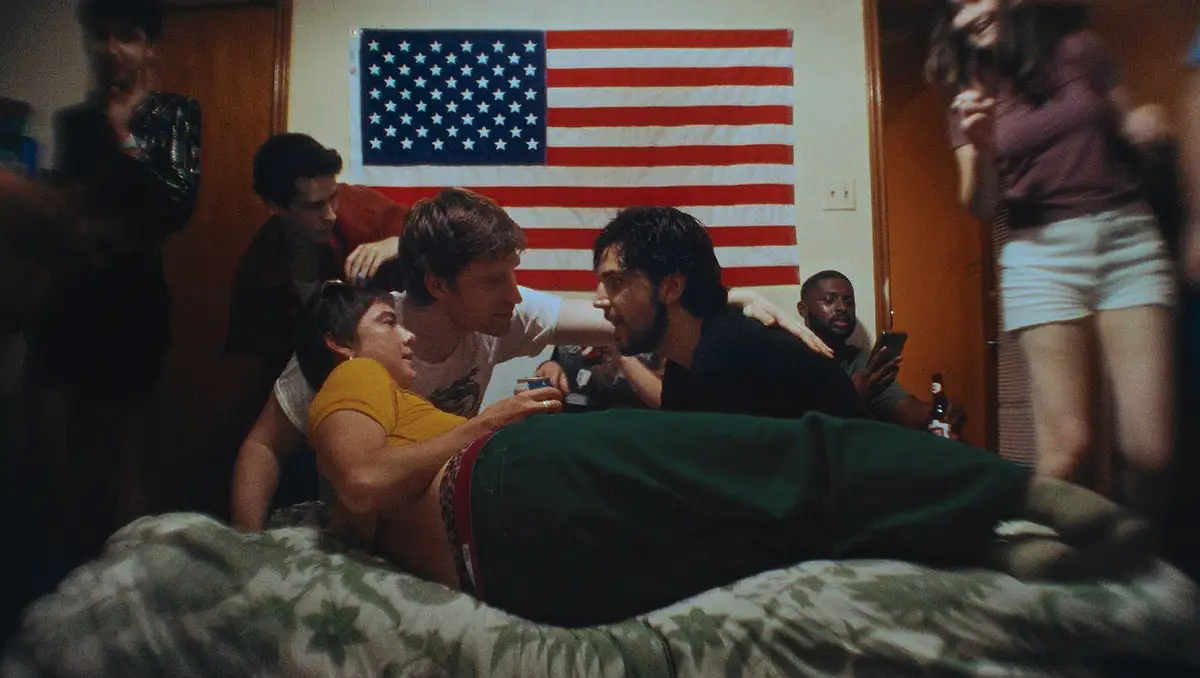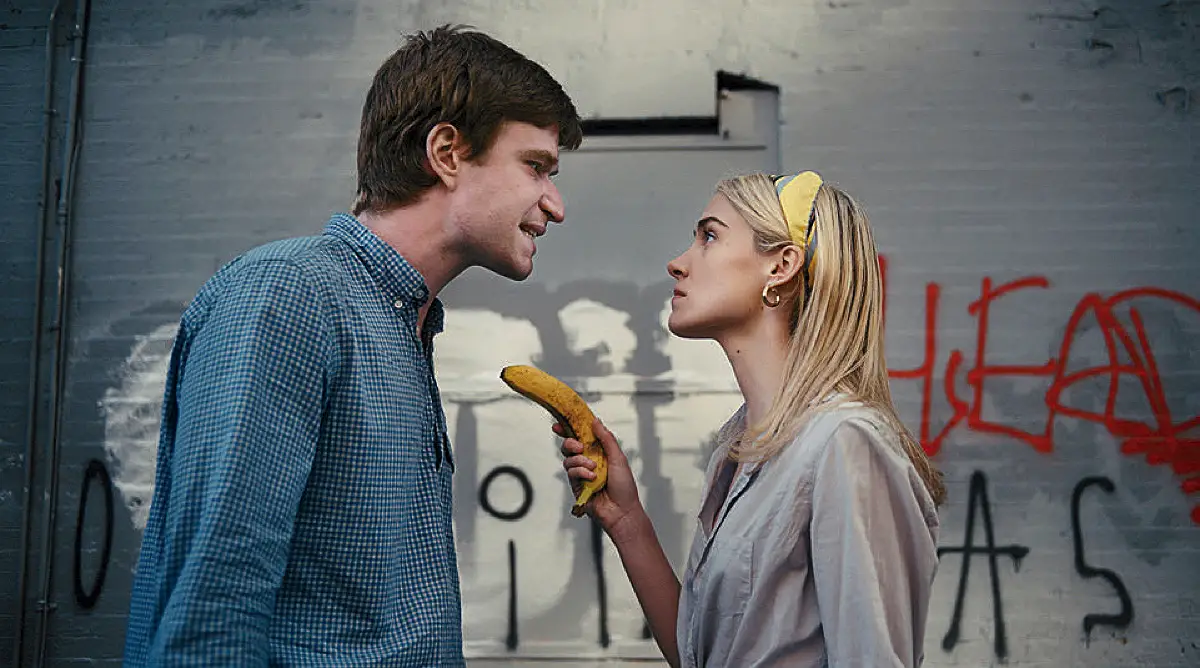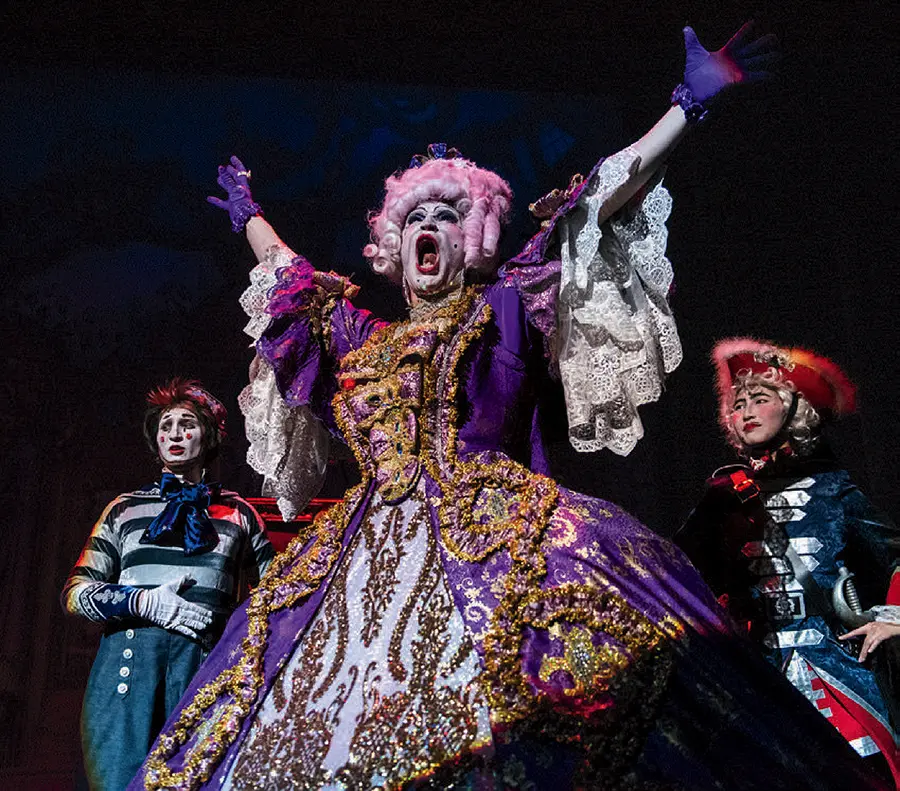The film Rent Free, which premiered last June at the Tribeca Film Festival, opens with a shot of a sunlit apartment: white walls and hardwood floors, eclectic artwork, green plants curling up a staircase. White sans-serif text overlaying the scene reads: “400 ROEBLING ST, UNIT A / BROOKLYN, NY 11211 / 2 BEDS, 2 BATHS / $8,000 / MONTH.”
After a beat, Ben—played by Jacob Roberts ’19—emerges from a bathroom, towel wrapped around his waist, head bent at nearly 90 degrees as he types on his phone. He walks into another room, climbs into bed beside his best friend, Jordan, then unplugs the latter’s phone from a charger so he can plug his own in. “What? My phone’s at 5 percent,” he says matter-of-factly. Jordan glances at Ben’s screen and gripes: “Can you stay off Grindr for one minute?”

Ben has just moved from Austin to New York, where college friends have agreed to let him stay with them for free; Jordan has tagged along to visit the city for a few days. Then Ben, in a characteristically short-sighted and self-destructive move, makes an advance on his host’s boyfriend—and is promptly kicked out. He and Jordan head back to Austin, where they make a pact: they’ll spend a year couch-surfing while working odd jobs to save enough to move to New York on their own.
The opening scene exemplifies what first drew Roberts to the script, written and directed by friend and frequent collaborator Fernando Andrés: a Gen Z sensibility that hasn’t yet made it to the big screen. “There are films that try to be Gen Z, but those are largely focused on cultural touchpoints or lingo,” says Roberts, who also co-produced Rent Free. “This film is more focused on: what is the experience of coming into adulthood in a moment of economic insecurity, the advent of the gig economy?”
Each time Ben and Jordan move to a new apartment, the text describing the rent and amenities reappears: the director’s most conspicuous means of filtering the world through their generation’s eyes, as characters view every home in a squeezed market with envy. There are subtler touches, too, like the straightforward depiction of queer sexuality—integral to the characters’ lives but not central to the plot—and a dry sense of humor that doesn’t explain itself to outsiders.
As Ben, Roberts drives much of that comedy. He has an expressive, reactive face and a sharp sense of comedic timing. In one sequence, he drives around Austin delivering fast-food orders. One customer who opens the door turns out to be a former professor; when he mentions he has a guest house, Ben’s eyes trail behind him as a scheme solidifies in his head. In another scene, Ben returns to the home of a customer who hasn’t left a tip. “Did you need help figuring out the tipping function?” he asks, his tone deadpan as she grows increasingly uncomfortable.
Roberts started performing in third grade, when his elementary school class in Washington, D.C., staged a Greek myth and he played Hades, god of the underworld. He was a sunny child and felt self-imposed pressure to maintain that image: “I was always very focused on being a good kid; I never wanted to be difficult.” Playing Hades, he says, he found “a space where some of the things I was holding in—because in other spaces it felt like they would be a burden to other people—were actually encouraged.”

That turned him into a “theater kid, just doing all the plays and all the musicals and everything.” At Harvard, he concentrated in theater, dance, and media and wrote for the Hasty Pudding Theatricals. After graduation, he moved to New York, trying to land stage roles while juggling day jobs. But when the pandemic began, he realized that “If I want to do a thing, I have to write my own thing, I have to direct my own thing, I have to produce my own thing.” In 2020, he turned a TV pilot he’d written into a screenplay for a short film, Half, in which half-Jewish, bisexual Jonah comes out to his girlfriend. He called friends, many from Harvard, to ask if they’d produce and act in it. During that process, Roberts found that film suited his creative vision better than theater. The camera captured subtler facial expressions, vocal shifts, and body language that felt central to his comedy, like “this magic box that sees into your brain,” he says, “and the audience can tell everything that’s going on in your mind.”
“It’s fun to play someone who thinks about things differently than you.”
The following year, he moved to Los Angeles to pursue filmmaking. At a festival, he met the director Fernando Andrés, whose work, like his own, looked at the world from off-kilter perspectives. The two began a continuing collaboration; Andrés wrote Rent Free with Roberts in mind for Ben. That character offered Roberts something like the role of Hades in third grade: a funhouse mirror version of himself. “If you spend all of your time worrying about trying to do right by other people,” he says, “it can be fun to just switch that off and be a bit of a selfish jerk”—which is his description of Ben.

But Roberts also came to empathize with Ben’s plight. He knows what it’s like to juggle gigs—his have included substitute teacher, textbook writer, and veterinary assistant—while pursuing a dream. And he understands the need to find scrappy solutions while on a limited budget. For a party scene, instead of hiring 50 extras, the Rent Free crew asked a friend if they could film a real get-together. To accommodate their compressed timeline—three days in New York and 30 days in Austin—they filmed all day and began editing the footage the same night. In Austin, Roberts crashed on Andrés’s couch.
Often, this was fun and exhilarating. But on one of the last days of the shoot, “I just broke down crying,” Roberts remembers. “I’d been really focused on the work and getting it done, making it happen, and I didn’t even notice that buildup of stress and exhaustion.” That day, he was filming a scene toward the end of the movie, when Ben and Jordan confront the weariness of constantly moving. Roberts’s own emotions helped him to understand Ben’s frustration at trying to grow up in a world where doing so can feel impossible. “It’s fun to play someone who thinks about things differently than you,” Roberts says. “You’re challenged to contort your mindset to match theirs. And maybe you come away being less judgmental or dismissive.”






